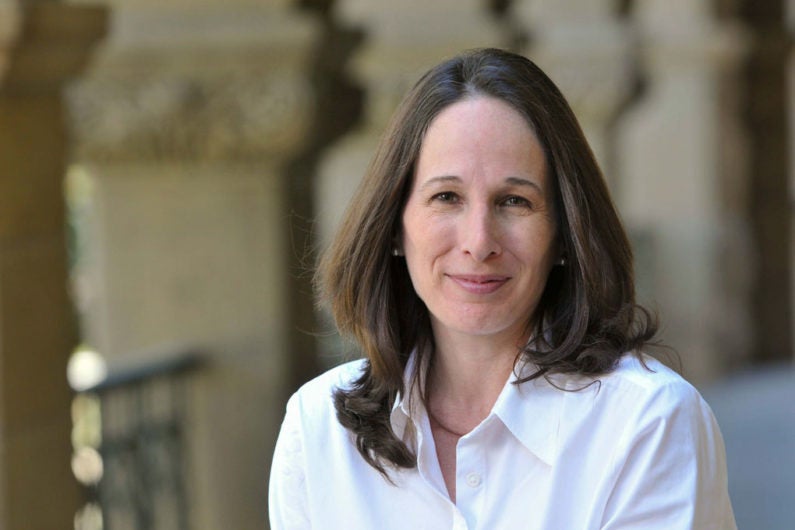Time to adjust U.S. national security strategy amid unraveling of the global order, Stanford expert says
The United States can lead by democratic example, not imposition; invest in the international order and help it adapt to new challenges; and adopt a flexible, efficient approach to using military assets against an expanding array of threats, Stanford political scientist Amy Zegart says.
The international order is unraveling, according to a Stanford scholar. Since the end of the Cold War, the United States has generally served as the top leader in this world order. But now the power equation is shifting, and the U.S. may see more countries challenging global rules and norms.

Rising Russian nationalism and aggression add to the complexity of a shifting world order, Stanford political scientist Amy Zegart says. Here, activists hold Russian flags near a monument to Red Army soldiers as they celebrate the incorporation of Crimea. (Image credit: Danil Semyonov/AFP / Getty Images)
Three key factors threaten the distribution of power and authority among nations, said political scientist Amy Zegart, co-director of Stanford’s Center for International Security and Cooperation and senior fellow at the Hoover Institution. But, she said, America can take a “pragmatic” approach to protecting its national interests.
The rise of China, more dangerous non-state actors than ever before and the weakening of international institutions are converging to create greater global instability, Zegart said.
Zegart co-wrote a journal article with Stanford political scientist Stephen Krasner about the benefits of a “pragmatic engagement” approach for the U.S. They also co-chaired a Hoover Institution working group on foreign policy and grand strategy to examine these issues.
If China continues to grow economically at its current rate, it will displace the U.S. as the country with the most material resources in the world, a position the latter has held for more than a century, Zegart said. Such a scenario comes with risks.
“It would mark the first time a great power would be a developing nation,” she said. “This has profound implications for the international order.”

Amy Zegart (Image credit: Rod Searcey)
For example, will China become a responsible stakeholder within the existing rules of the global order, Zegart said, or will it challenge that order?
“The record so far is decidedly mixed,” she said, noting that even if China wants to uphold the international economic and political order, it’s not clear that it can, based on its domestic political situation.
On terrorism, technology has given weak states, non-state actors and even lone individuals the ability to wage cyberattacks, biological attacks and – potentially – nuclear attacks, according to Zegart.
“In this world, uncertainty abounds,” she said. In such an environment, people and even nations tend to retreat and not engage outside their spheres. “That’s part of the reason why in a recent survey, more than half of all Americans said they felt less safe today than they did on 9/11.”
Finally, international institutions such as the United Nations Security Council, the International Monetary Fund and the European Union are “misaligned with power realities,” as Zegart describes it.
“Institutions freeze into place the power relationships that exist at the time of their creation. They struggle to adapt to change. We see this at the domestic level, too. The U.S. government is built around a 1947 national security architecture that has a hard time adapting to 21st-century challenges, from cyberthreats to homeland security,” she said.
Challenges to power
In the short term, Zegart said, the world is likely to see more contests for influence and more actors challenging what the United States will do. When the U.S. is not the guarantor of this order, the dynamic invites boundary testing.
“We see this with Iran’s missile testing, even after the Iran deal. We see it with Russia’s invasion of Ukraine and hacking into the Democratic National Committee’s computers. We see it with China’s aggressive maneuvers in the South China Sea. We see it with North Korea’s escalation in the frequency of its nuclear and missile tests,” Zegart said.
Boundary testing is not healthy for international relations – it raises the odds of crisis escalation. “Meanwhile, leaders are so busy managing the crisis du jour that seeing emerging dangers becomes much more difficult,” Zegart said.
To address the challenges, U.S. national security policymakers should “return to the basics and ask what our objectives are in a more chaotic world and what strategies we think will best achieve them, and then deploy resources to meet those objectives,” Zegart said.
Guiding principles
The working group that she and Krasner co-chaired advocated three guiding principles for U.S. national security strategy.
“First, we have to be unapologetic about the pursuit of American economic and security interests, and more tempered in the pursuit of our ideals. We have always as a nation stood for universal freedoms but we have pursued those freedoms abroad in different ways, to different degrees, in different times as the external environment demanded and internal capabilities allowed,” she said.
Zegart said the U.S. should lead by democratic example, not democratic imposition.
“The most fruitful path toward spreading democracy is not toppling dictators without a clear path to a successor regime. It comes from bolstering civil society for internal transitions to democracy and demonstrating the benefits of democracy here at home,” she said.
Second, the U.S. can reform the international order by bolstering alliances and regional organizations, Zegart said. This includes Europe and the Asia Pacific region, and international institutions like the United Nations, World Bank and International Monetary Fund.
“We are advocating pragmatic international engagement, not isolationism,” she said.
Third, Zegart suggests that America can develop flexible unilateral capabilities that can be deployed against a wide array of increasing threats.
“The world is uncertain and our resources are limited. Smarter spending starts with developing more agile military capabilities and more robust non-military levers to advance our vital interests. We need Pentagon acquisition reform, moving from exorbitant, niche weapons systems like the F-35 Joint Strike Fighter and investing in low-cost unmanned systems and cyber capabilities,” she said.
Zegart noted that Defense Secretary Ashton Carter is working hard to reform the way the Pentagon does business, but he faces resistance from entrenched interests.
As for the domestic and political impacts of a less stable world, Zegart said it is difficult to foresee all the consequences.
But she pointed to some disturbing indicators: growing chaos across the Middle East, rising nationalism in the U.S. and Europe, rising tensions in the Asia-Pacific region and domestic politics in many countries.
“I worry about rising political violence, erosion of trust in many institutions, not just political ones, and the backsliding of democracy, both in the United States and abroad,” she said.
